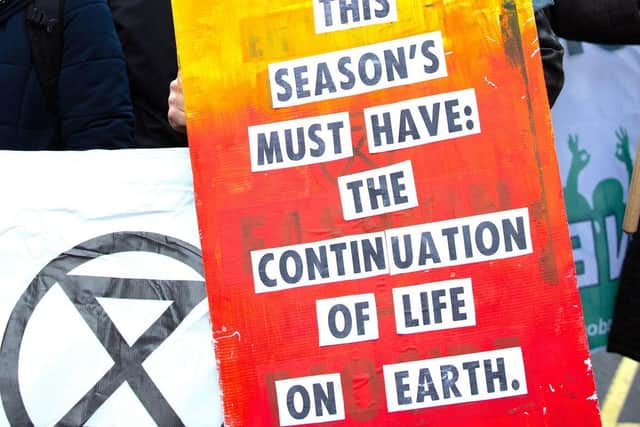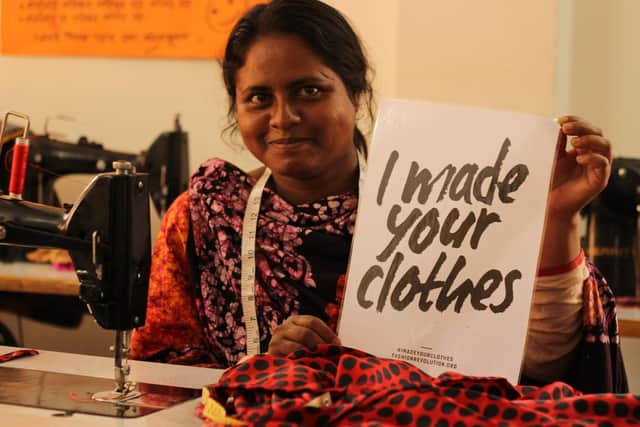Government must have a role in reducing environmental ruin caused by fast fashion
The amount of clothing bought by consumers increased by almost 20 per cent between 2012 and 2016, and around 921,000 tonnes of used textiles are thrown out by households every year.
And this only increased during the coronavirus pandemic, with Leeds, Sheffield, and Hull all among the top 20 places producing the most CO2 as a result of the number of fast fashion searches on Google.
Advertisement
Hide AdAdvertisement
Hide AdExperts say that North could be at the forefront of a sustainable fashion revolution ahead of the launch of a new initiative committed to cutting carbon emissions, with 10 major retailers already signed up.


Charity WRAP found people across the UK are set to dispose of 67m items of clothing as lockdown lifts.
And despite bricks and mortar shops largely being closed, online retailers have prospered.
In October, online fashion retailer ASOS said its annual profits more than quadrupled to £142.1m for the financial year to August as it benefited from lockdown trends.
Advertisement
Hide AdAdvertisement
Hide AdWhile fast fashion giant Boohoo saw sales soar during the lockdowns of 2020, with a 40 per cent increase in revenue in the time of the coronavirus pandemic.


However WRAP said 50 per cent people actively avoid generating clothing waste, a rise of 20 per cent in years.
WRAP will officially launch Textiles 2030 on Monday, which is described as a “ground-breaking, expert-led initiative, harnessing the knowledge and expertise of UK leaders in sustainability to accelerate the whole fashion and textiles industry’s move towards circularity and system change in the UK”.
The voluntary agreement will set a benchmark for cutting carbon by 50 per cent, which would put the UK textiles sector in line with limiting global warming to 1.5°C, in line with the Paris Agreement on climate change and achieving Net Zero by 2050 at the latest.
Advertisement
Hide AdAdvertisement
Hide AdAnd Marcus Gover, chief executive of WRAP, said: “The UK Parliament has investigated the textiles sector twice in recent years and is now looking at UK fashion companies to act. Our research shows that consumers want sustainable clothes not disposable fashion.


“Textiles 2030 is about transforming textiles and creating a fashion sector fit for the future. We need fast, effective action from businesses more than ever. Brand and retail signatories must show their commitment by signing up to Textiles 2030. Businesses who fail to engage will be noticeable by their absence. If your business is not already involved in Textiles 2030, now is the time to sign up.”
It comes as Environmental Audit Committee (EAC) chairman Philip Dunne MP called for more Government involvement in tackling both the environmental impacts and the moral failings of fast fashion.
Speaking to The Yorkshire Post Mr Dunne said: “We think there is a role for Government, and we've suggested in our reports and letters to the Government that there should be a garment trade adjudicator.
Advertisement
Hide AdAdvertisement
Hide Ad“So,in parallel or similar to the grocery trade adjudicator which was introduced because of the dominance of the supermarket retail power in the food sector.”


He said: “We think that that is something that the Government needs to look at and they've indicated that they haven't ruled it out.”
The committee released on Thursday a letter from the Business Secretary Kwasi Kwarteng confirming he would look into the proposal.
The committee’s interest in fast fashion started under former Wakefield MP Mary Creagh’s chairmanship where MPs wanted to examine how “we should try to make clothes not throwaway, or at least not sell for throwaway prices so that people come to value them and use them for longer”.
Advertisement
Hide AdAdvertisement
Hide AdBut Mr Dunne said this soon ballooned to include ethical issues as well as environmental when awful working conditions were highlighted last year in “garment factories that are being used by the bigger chains and particularly online retailers”.
“We've seen those brands snapping up the bricks and mortar stores on the high street which haven't been able to trade properly so they're becoming more prevalent in our shopping habits,” Mr Dunne said.
“And they have an obligation in our view, to start trading in a mature and a more ostensibly responsible way.”


Mr Dunne said while the design side of fashion tended to be concentrated in the South, the warehouse operations were largely in the Midlands and the North.
Advertisement
Hide AdAdvertisement
Hide AdIt comes as today marks Fashion Revolution Day, where people are being asked to tag major brands online with the hashtag #WhoMadeMyFabric.
The fashion activism movement, formed after the Rana Plaza factory collapse in Bangladesh in 2013 which killed over 1,100 people, is pushing the global fashion industry to conserve and restore the environment and values people above growth and profit.
The organisation says garment production is predicted to grow by 81 per cent by 2030, and so there was an ever-growing demand for agricultural land to produce cotton, viscose, wool, rubber, leather hides and other natural fibres.
It said 150m trees are logged every year to be turned into cellulosic fabrics, such as viscose, and cattle ranching is the largest driver of deforestation in the Amazon. Fashion Revolution said cutting down forests leads to habitat loss and makes the risk of disease transmission from wildlife to humans more likely, increasing the risk of future pandemics.
Advertisement
Hide AdAdvertisement
Hide AdFashion Revolution Co-founder Carry Somers added: “Last spring, I saw at firsthand the impact our clothing is having in the remotest corners of the planet. I sailed over 2000 miles into the South Pacific Gyre, and every water sample we took contained fibres from our clothes. Tap water across the world, including the US and Europe, is widely contaminated with
microfibres, harbouring toxic chemicals that can affect our health.”
She also pointed to some of the most severe and exploitative working conditions and worst environmental damage happens deep within fashion supply chains where materials are grown and fabrics are made, as evidenced by recent revelations of forced labour of Uighurs in the Xinjiang region of China. And she said the time has come to demand a deeper level of transparency, to ask not only #WhoMadeMyClothes but #WhoMadeMyFabric and who grows the cotton.
The drive towards sustainability is already in the consciousness of many people in Yorkshire, including 24-year-old Eve Griggs who has sworn off fast fashion.
Advertisement
Hide AdAdvertisement
Hide AdMiss Griggs, who lives in Leeds, said her commitment first came from a love of fashion and an aversion to wearing the same as her peers.
“But I developed this moral compass mainly about exploiting people,” she said. “I ended up becoming really aware of, especially with the stuff in the news, the uncovering sweatshops in the UK who were supplying these fast fashion retail retailers.
“And it doesn't sit well with me.”
Miss Griggs recognised there was a place for fast fashion and cheap clothes.
“Growing up, I couldn't afford a lot, Primark was great, supermarkets were great. But a lot of these online retailers, they're extreme, we don't need that.
Advertisement
Hide AdAdvertisement
Hide Ad“And it doesn't look particularly great for our reputation in the North because they're all based up here as well.”
But Mr Dunne said practices were starting to change.
“I think they are starting to become more socially responsible,” he said, referencing the Textiles 2030 scheme launching on Monday.
And in a letter to the EAC published today Boohoo confirmed it would consider aligning senior staff bonuses with improving standards, a key ask of the EAC.
A Government spokesperson said: “The industry has made strides in reducing its impact on the environment, but there is more to do, and we support the new Textiles 2030 initiative to halve the sector’s carbon footprint within 10 years.
“Through our world-leading Environment Bill and landmark waste reforms, we will take steps to tackle fast fashion by incentivising recycling and encouraging innovation in new design.”
Comment Guidelines
National World encourages reader discussion on our stories. User feedback, insights and back-and-forth exchanges add a rich layer of context to reporting. Please review our Community Guidelines before commenting.